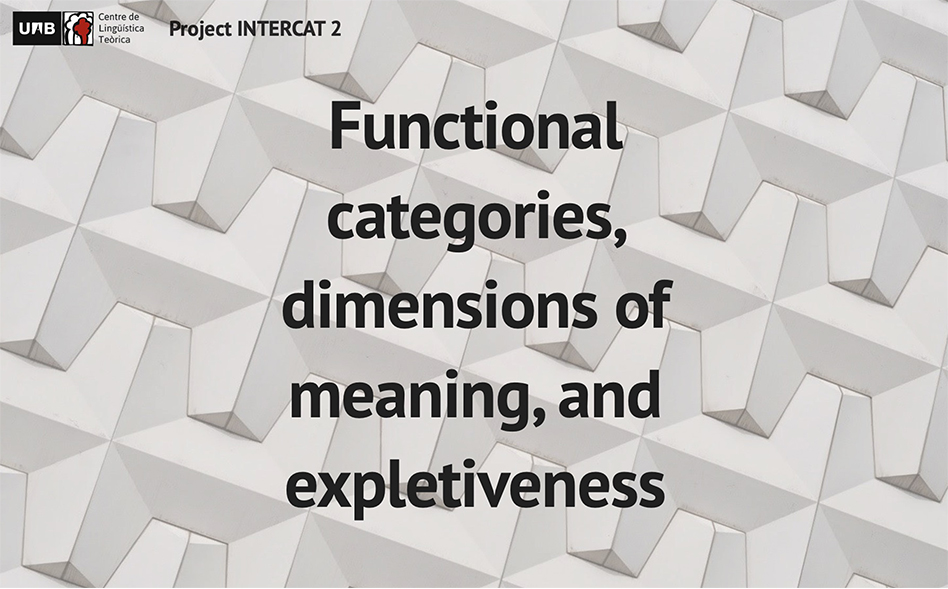Workshop Functional categories, dimensions of meaning, and expletiveness
Project grant The Interpretation of Functional Categories II: Expressive Meanings and Meaning Hierarchies (INTERCAT II)
El workshop, organitzat per M.Teresa Espinal, Susagna Tubau i Xavier Villalba (projecte de recerca INTERCAT 2), tindrà lloc entre el 12 i el 14 de juny del 2024 a la UAB.
June 12s-14, 2024
Sala d’Actes Frederic Udina (B7/1056). Facultat de Filosofia i Lletres, UAB
Pàgina web del Workshop | Programa en PDF
The Workshop
When building meaning compositionally, the bricks are lexical categories (N, V, A) and the mortar are functional categories (D, Num, Tens, Asp, v, Neg, Top, Foc, etc.). In this respect it is wise to think that, while lexical categories contribute to the propositional content of a sentence, functional categories constrain it by articulating the relations that lexical categories may have.
In this workshop we aim at exploring the hypothesis that functional categories also contribute to the expressive meaning associated with sentences/utterances, and therefore contribute to the grammar of speech acts. We can think of several phenomena supporting this hypothesis: (1) polydefinites and plural mass nouns in Greek, (2) high negation in English, (3) overt first-person pronouns with psychological verbs and impersonal sentences in Catalan, (4) deverbal discourse markers in Spanish, (5) expletive complementizers in exclamative sentences, etc. What these constructions all have in common is the use of functional categories to convey expressive meanings, that is, the emotions and attitudes of the speaker at the time of performing a speech act.
While some of these phenomena have received attention in the linguistics literature, they have been typically factored out of syntax, and placed in a separate representation level dedicated to not at-issue meaning (Gutzmann and Gaertner 2013; Potts 2005, 2007) or, alternatively, they have been integrated in the left-periphery of the sentence (Krifka 2015a, 2019, 2021; Wiltschko 2017, 2021). We would like to discuss these views and investigate the role of expressive meaning in the process of updating the common ground.
Program
June 12
Functional categories and speech act information
9:15-9:30 Welcoming
9:30-10 O. Borik & I.I. Teomiro
Datives at the syntax-pragmatics interface
10-10:30 V.N. di Caro, A. Massaro, L. Molinari
Non mi va a cadere? Interpretability and stackability of Italian mirative markers
10:30-11:30 M. Krifka
The structure and interpretation of declarative clauses: Assertions, declarations, exclamations, miratives, wishes, promises, commands, and questions
11:30-12 coffee break
12-12:30 M.T. Espinal & S. Cyrino
Experiencers as speakers and judges. The case of the jo ‘I’ construction
12:30-13 J. Ausensi & S. Buchczyk
Exploring rhetorical imperatives
13-14 lunch time
14-14:30 C. Cavirani-Pots, E. Cavirani, G. Vanden Wyngaerd
Two ways to be expressive. The case of the Italian expressives cazzo and merda
14:30-15 X. Villalba
Mirative markers in the Speech Act Layer of exclamative sentences
15-15:30 coffee break
15:30-16 A. Kocher
Complementizers, commitment and modification in Ibero-Romance
June 13
Functional categories, expletiveness, and expressiveness
9:30-10 S. Buchczyk
How mood determines the nature of updates
10-10:30 L. Baunaz, A.-L. Demonie & E. Lander
Modal particles, their negators and expletive negation
10:30-11:30 A. Mari
Expressivity and semantic composition : evidence from mica exclamative questions
11:30-12 coffee break
12-12:30 P. Morosi
On the non-expletiveness of the Italian “expletive” definite article
12:30-13 D. Seres & L. Molinari
NP marking in Slavic: bare vs non-bare subjects
13-14 lunch time
14-14:30 S. Rossi, C. Chesi & M. Greco
The syntax of expletive negation in (social-media) English: the case of not-me sentences
14:30-15 S. Cyrino
On (low, emphatic) verbal negation in Brazilian Portuguese
15-15:30 coffee break
15:30-16:30 E. Tsiakmakis
Studying Greek expletives across domains: the expletiveness – expressivity link… but stronger
20:30 Dinner
June 14
Strenghthening and dimensions of meaning
9-9:30 F. Osawa
More attention to a hearer! The meaning of functional category DP emergence
9:30-10 V. Colasanti & M. Wiltschko
I am here and this is new. You are there and that is old. The role of speaker and addressee in the interpretation of demonstratives
10-11 J. A. Mendia
A grammatical recipe for kind construction
11-11:30 coffee break
11:30-12 C. Facchin
On the deictic status of complementizerless clauses: a comparison between Spanish and Italian
12-12:30 N. Munaro
Non-integrated conditionals as speech-event modifiers: evidence from Romance
12:30-13 N. Bosch
The case of Rita: expressives and negative indefinites in Catalan and Spanish
13-14 lunch time
14-14:30 G. Barberà, P. Cabredo Hofherr & R. Veiga Busto
Layers of meaning in Catalan Sign Language (LSC) indefinites
14:30-15:30 M. Steinbach & C. Ebert
Demonstrations in spoken and sign languages – iconic strengthening and dimensions of iconic meaning
15:30-16 Closing remarks


